- Home
- Michael McDowell
Jack and Susan in 1953 Page 11
Jack and Susan in 1953 Read online
Page 11
Jack felt hopeless, cut off.
But it wasn’t quite true that nobody visited Jack; Maddy, his secretary, came. She brought work. He tried to put her off.
“I can’t do any work,” he said. “I fell out of a window.”
“You’ve used that excuse before,” said his secretary darkly. Maddy, a bottle blonde who had worn leopard prints long before they came into fashion the previous winter, was a bitter person. If Maddy took any joy in life, Jack wasn’t sure what form it took, and he wasn’t even sure he wanted to find out. She had eyes the color of new steel, and skin the color of boiled chicken, and her hair was the color of corn in the ad for Nucoa margarine. Maddy gave new dimension to the concept of tightness in dress. Her job, before coming to Jack’s firm, had been as a receptionist at an advertising agency whose principal client was a manufacturer of ladies’ foundation wear. In her tenure there, she’d gotten a lot of free samples. Maddy always looked trussed-up beneath her clothes. She had also been one of the first women in Manhattan—and perhaps the world—to have created a wardrobe made entirely from synthetic fabrics: rayon, nylon, Dacron, Orlon, and Fibrolane. All of Maddy’s clothes seemed to whine whenever she sat down. Though Maddy looked as if she should be a manicurist and she was frequently extremely impertinent, she could take an astonishing two hundred words a minute in dictation, and was very efficient.
“Maddy,” pleaded Jack, “write my letters for me. Pretend I’m giving you dictation, then just type them up and send them off.”
“I have to have your signature,” said Maddy reproachfully, as if he’d just asked her to find him a gun with which to assassinate the mayor. Maddy’s voice was high-pitched and breathless, which wasn’t surprising considering the tightness of her underpinnings.
“Forge my signature,” said Jack. “You have for years anyway.”
Maddy wasn’t having any of it. Maddy visited him every morning, made Jack look over the previous day’s correspondence, took down his dictation, and then made him sign the letters he’d dictated the day before.
“Maddy,” Jack asked on Thursday as he was mechanically signing a sheaf of documents with no memory of having dictated them, “have there been any messages for me at the office?”
Maddy was perched on a little aluminum chair, with her head bent down between her knees, brushing out her peroxided locks. Maddy was a fabulous secretary in her way, but her habits of personal grooming knew neither appropriate season nor place.
“I bring you all your messages,” said Maddy, with sullen rebuke, and still bent over.
“I mean have there been any personal messages?”
“I bring you all your messages,” she repeated, lifting her head, and staring at him. She held her hairbrush aloft as if threatening to hurl it at him if he asked another question.
“Well,” said Jack, chancing the injury, which would have been slight compared to what he’d already suffered, “have there been any people to call up and say, ‘Is Jack there?’ and when you say no, they don’t leave a message, they just say they’ll call back later? Has there been a woman calling up? Has there—”
Maddy was growing exasperated. She put away her brush and pulled a mirror and a box of Lady Esther face powder out of her alligator bag—it was more like a small trunk—and began critically to examine her face.
Jack rambled on for a few moments. “—been anybody who maybe called up and asked what hospital I was in, or—”
“No,” said Maddy, patting the sides of her face with the powder puff, so that the room was instantly suffused with the scent of Lady Esther. It was different in odor but not in intensity from the smoke of the deceased fat man’s cigar.
“No,” she repeated, “no one’s called. No one’s left a message. No one wants to know how you are or where you are and whether you’re going to live or die. Mr. Estess says to tell you that you have five more days of sick leave but then they turn into vacation days and you only have two of those, so you’d better get well quick.”
Mr. Estess was director of personnel. Mr. Estess, for some reason, was interested in Maddy. Maddy tolerated Mr. Estess because Mr. Estess provided gossip and on frequent occasions juggled his books to give her an extra sick or vacation day.
“I can’t believe this,” said Jack. “I can’t believe that nobody has come to visit me.”
“Nobody’s asked about you either,” said Maddy, rummaging in her purse. She came up with a small bottle of Mum Mist spray deodorant and Jack fervently hoped she wasn’t going to apply it in his presence. Maddy regarded it for a few moments, and then dropped it back inside her bag. “Would you like me to call up somebody for you?” Maddy asked vaguely, with some remote semblance of polite concern.
“My fiancée hasn’t even called,” said Jack miserably.
“The one whose apartment you jumped out of the window from?” said Maddy.
“I didn’t jump out the window because of her. I jumped—wait a minute. I didn’t jump at all, Maddy. I fell. It was not a suicide attempt. It was a stupid accident, and I’m lucky to be alive. I just wish somebody cared. Libby hasn’t called?”
“Her lawyer called. This morning.”
“I thought you said nobody called.”
“I didn’t count him because he didn’t leave a message. People who don’t leave messages don’t count.”
“What did he want?” demanded Jack impatiently.
Maddy, still peering at herself in the mirror, asked, “Is one side of my face darker than the other, Mr. Beaumont?”
“What did Libby’s lawyer say?”
“Nothing!” Maddy screamed back. “He didn’t say anything! He said, ‘Is Mr. Beaumont there?’ I said, ‘Mr. Beaumont is in the hospital.’ He said, ‘Do you think he’s still going to be there on Sunday?’ And I said, ‘I’m not his doctor so I wouldn’t know.’ He said, ‘Thank you.’ I said, ‘You’re welcome.’ He said, ‘Good-bye.’ I said, ‘Good-bye.’ Satisfied?”
“Why would Libby’s lawyer want to know if I’m still going to be in the hospital on Sunday?”
“Maybe he wasn’t a lawyer at all. Maybe he was a thief who wants to break into your apartment on Sunday morning and doesn’t want to get caught.”
Jack considered Maddy’s suggestion and rejected it. He felt sure that the man on the telephone had indeed been Libby’s lawyer, wanting to know whether Jack was going to be out of the hospital by Sunday or not. But why?
Jack begged the doctor to tell him when he’d be able to leave.
The doctor examined him, consulted his record, thought for a moment, and then replied, “Your arm has begun to heal, and as long as you keep it in that cast, you’ll be fine. Your head is as right as it’s ever going to be, and you appear to have gotten a little rest. I think there should be no problem if I let you out”—he thought for a moment—“say on Sunday morning. In time to see if Juliet’s going to die.”
“Juliet?”
“‘The Heart of Juliet Jones,’” said the doctor in surprise, staring at the bandages on Jack’s head, as if he’d suddenly decided that perhaps Jack wasn’t fully recovered after all. “She thought she just had the mumps, but this morning Dr. Chet Davis told Juliet’s sister the truth.”
When Maddy came the next morning she looked as if she’d finally laced herself in too tightly. Her steel blue eyes wandered a little, and beneath the layers of powder and paint her face seemed more pallid than usual.
She wasn’t even carrying her alligator bag.
“Good morning, Mr. Beaumont,” she said in a tentative, breathy whisper, and seated herself on the edge of the aluminum chair. Her pink rayon skirt whined in protest. “How do you feel?”
“Pretty terrible, to tell the truth. You didn’t bring another briefcase-load of work for me to look at?”
She shook her head.
“You didn’t bring the letters I dictated to you yesterday?”
She shook her head again. The rayon skirt—and Maddy inside of it—slid backward on the chair.
She looked forlor
n. Jack was worried. Maybe someone in her family had died.
“No messages for me?”
“Just one,” she said hesitantly.
“From…”
“From Mr. Estess,” she said, with a sudden eagerness to get this over with, whatever it was.
“Yes?” Jack prompted.
“You’re fired.”
CHAPTER FIFTEEN
SUSAN BRIGHT WAS calmer after she had asked Rodolfo to take her to dinner. Calmer, but much more angry. Angry with Libby for the smug satisfaction she’d shown Susan at the door of Jack’s apartment. Angry with Jack for leading her on the way he had—interrupting a proposal of marriage by flinging yourself in through a window argued a certain continued interest in the lady concerned. Angry with herself for letting Libby get the best of her, and for ever believing that Jack Beaumont would turn out to be something other than what he was today and always had been—a total cad.
She fairly vibrated with animosity toward Jack as she passed Sixty-sixth Street on the Madison Avenue bus on her way to work.
The club women on her guided tours that day at the Metropolitan came away from the galleries with the unfortunate impression—engendered by Susan’s tone of voice, and sharp commands—that the Golden Age of Athens must have been something similar to Hitler’s Third Reich.
After work Susan went straight home and climbed into a hot bath. When it grew cold, she ran hot water again, and soaked some more. Woolf whined and scratched at the bathroom door. When that didn’t gain him entrance, he tried barking. When that didn’t work, he pulled all the covers from Susan’s bed, dragged them into the kitchen, and went to sleep on the soft pile. In the tub, Susan tried not to think of anything, but she could not blot out what had happened the day before.
She wore gloves that evening because her fingers were so water-wrinkled.
Rodolfo took her uptown to La Caravelle for dinner. That made her feel good, even though the restaurant was only ten blocks south of Jack’s apartment, and four avenues over.
Rodolfo was wearing a new suit, a light-colored tropical-looking linen suit. Susan didn’t like it. It wasn’t quite the season yet; it was still a few weeks till the time Manhattan men allowed themselves lighter colors. And the suit somehow made Rodolfo look more Cuban. Extraordinarily handsome still, of course—but handsome in a, well, Cuban sort of way. She said nothing about the suit, however, though she flushed when she saw the maître d’ eyeing it with what she took to be disapproval. As if a too-light suit were more ridiculous than the bow-tied mink stole worn by the floozy who was escorted in right after them.
Two martinis, a bottle of wine, and La Caravelle’s fine food began to restore Susan’s equanimity. It was a relief also that Rodolfo had not renewed his proposal of marriage, though she expected it to come before the end of the evening. That put her in mind of another engagement. The thought occurred to her again and again, until it was like a chant in her mind, that Libby and Jack were both fools and deserved each other.
…deserved each other…
…deserved each other…
…deserved each other…
Rodolfo reached inside the pocket of his linen jacket and withdrew a long, oversized white envelope. He placed it on the table between them.
Susan looked at it and him quizzically.
“Open it, please,” he said.
She took up the envelope and held it to her breast a moment as the waiter took away some of their dishes. When the waiter was gone, she took out the papers that were inside.
The alcohol was making Susan’s head swim. The romantic lighting in the restaurant was dim and it was hard to read the small lettering.
“They’re tickets,” she said finally, and pushed them back into the envelope. “Tickets on the Italian Line. Tickets for where?” she asked, forming her words carefully, trying not to sound as tipsy as she felt.
“Two first-class cabins on the Andrea Doria. Sailing for Cuba a week from tomorrow.”
Susan stared, not quite sure what to say. Nothing came to mind. She opened her mouth, and what came out was “To Cuba…”
“My home. You must meet my family—and your uncle, of course. I have already written him, and I have had a letter from him today. He says we must stay with him for a few weeks. He says that he feels very ashamed—he has neglected his favorite niece for far too long.”
“I am his only niece,” Susan pointed out.
“He says that he will build us a house to live in. I will run his plantation and you will make him laugh.”
Susan smiled, though she knew that a smile at this juncture might get her into trouble. “He says my letters make him laugh,” she said to Rodolfo. “I don’t make anybody else laugh. I make most people uncomfortable.”
“That is because you tell the truth.”
Susan looked away, thinking about Jack and Libby. She hadn’t told either of them the truth.
…deserved each other…
If she had told Jack that there was still some possibility of love between them, instead of insulting him every time she ran into him, then perhaps he wouldn’t now be in the clutches of Libby Mather.
If she had told Libby that she wasn’t done with Jack Beaumont yet and that she—Libby—was to stay way the hell away until Susan was done with Jack Beaumont then maybe Libby wouldn’t be wearing that dreadfully ostentatious diamond on her finger. Libby wouldn’t say it was an engagement ring, but she denied it in such a way that it was no denial at all.
If Susan had spoken up and told the truth, she wouldn’t be practically engaged to this handsome Cuban sitting across the table from her.
She hadn’t told the truth; and now she must pay the consequences.
He was speaking to her in Spanish. And probably had been for some time, but her mind had been wandering, and it was befuddled with the martinis and the wine. Now a second bottle of wine had been brought to the table, and Susan was replying to him in Spanish. It really wasn’t a very good idea, though she didn’t know exactly why that should be so.
“Do you prefer to be married here or in Cuba?” Rodolfo asked.
Susan sipped at the wine he’d poured her, and thought, How do I get into these situations…?
“If we get married here in New York,” Rodolfo went on, “the wedding will be held in the home of the Cuban consul and we will need only one cabin on the Andrea Doria. And if we get married in Cuba, the wedding will be held in the home of your uncle.”
Susan continued to sip her wine. She smiled, though a smile was now more dangerous than ever. She thought about it all, and to her surprise, she didn’t have any difficulty imagining it happening. It was certainly no stranger than imagining the wedding of Jack and Libby. She knew that she ought also to consider what life with Rodolfo would be like after the ceremony, but she was tired, and she’d been through a lot. Her imagination at this interesting point seemed to give out.
“Which will it be?” Rodolfo persisted. “New York or Cuba?”
Susan took another sip of wine.
“Cuba,” she said.
Susan was hung over the next day. She decided to take the day off, and she called in sick.
“Did I do the right thing?” she asked Woolf over breakfast.
Woolf hesitated, as if waiting for her to explain, about what?
“About Rodolfo,” said Susan.
Woolf wagged his tail rapidly. Evidently he felt that she had.
The telephone rang. She was certain it was Rodolfo.
A little perversely, she felt that her acceptance of his proposal of marriage should be enough; he shouldn’t pester her with telephone calls. She placed a pillow over the telephone, which muffled the ring until Woolf pulled the pillow off in order to play with it as if it were a dead animal.
Susan took Woolf out with her about eleven o’clock. She walked around Washington Square, then set off west, along Christopher Street toward the Hudson River. She bought herself and Woolf hot dogs from a vendor, not forgetting that Woolf liked ketchup
and relish. She decided to try to call Jack—to tell him that he really was going to have to take his dog back as she was going to Cuba in order to get married and she had no intention of taking Woolf along with her on the Andrea Doria, not because she wasn’t fond of Woolf, but because there wasn’t time even to apply for a quarantine exemption. She dialed his number from a pay phone, but he wasn’t at home.
Susan stood at the end of Christopher Street and watched the Cunard Line ship Caronia pass downstream. It was headed toward the Battery, toward the Statue of Liberty, and out to sea toward some other country. She could see the passengers, with champagne and balloons, leaning over the deck rails and waving. A week from today, a week from this very moment, she’d be on another ship, headed toward Cuba. Depressed for some reason, she bought Woolf another hot dog, and spilled ketchup on her shoes.
When she returned home, there was a telegram waiting for her.
There were four folded sheets inside the envelope. Her landlady on the first floor had tipped the delivery boy fifteen cents, and demanded that she be reimbursed.
Susan gave the woman three nickels, explained that Woolf wasn’t there permanently but was only visiting for the afternoon, and then—having got rid of the landlady and locked Woolf in the bathroom—she sat down and read the telegram.
It was in bad German, and it bore no signature.
She read it through again.
She stared out the window at the brick wall.
Woolf was barking in the bathroom. She got up and let him out. He bounded through the apartment with all the apparent joy of someone who’s been unjustly locked up for years seeing unbarred sunlight for the first time again.
Susan read through the telegram a third time. It no longer seemed so strange to Susan that the telegram had been composed in German.
She crumpled up the four yellow pages into a ball and placed them on a saucer and set a match to them. The burning fired a black circle on the surface of the china, but Susan didn’t care. She was somber, and her hangover was gone.
Accepting Rodolfo’s invitation to travel to Cuba aboard the Andrea Doria now appeared to have been a very wise thing to do.

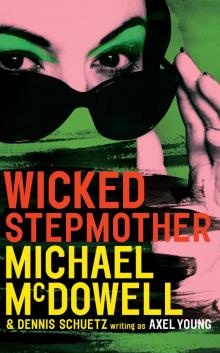 Wicked Stepmother
Wicked Stepmother Blackwater: The Complete Caskey Family Saga
Blackwater: The Complete Caskey Family Saga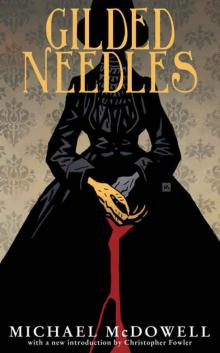 Gilded Needles (Valancourt 20th Century Classics)
Gilded Needles (Valancourt 20th Century Classics)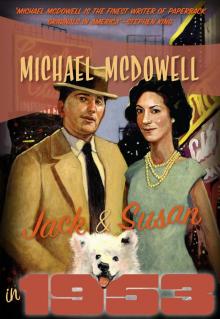 Jack and Susan in 1953
Jack and Susan in 1953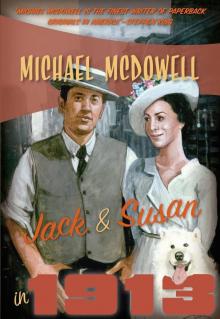 Jack and Susan in 1913
Jack and Susan in 1913 Rain
Rain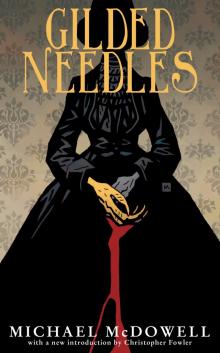 Gilded Needles
Gilded Needles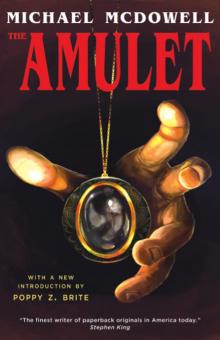 The Amulet
The Amulet Cold moon over Babylon
Cold moon over Babylon The Elementals
The Elementals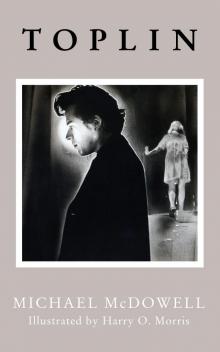 Toplin
Toplin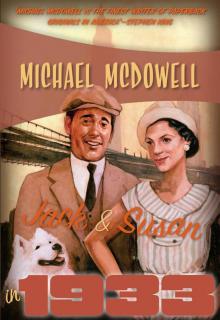 Jack and Susan in 1933
Jack and Susan in 1933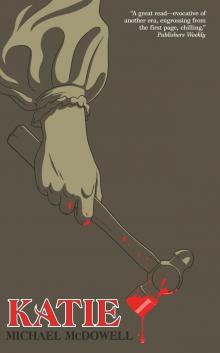 Katie
Katie The Valancourt Book of Horror Stories
The Valancourt Book of Horror Stories